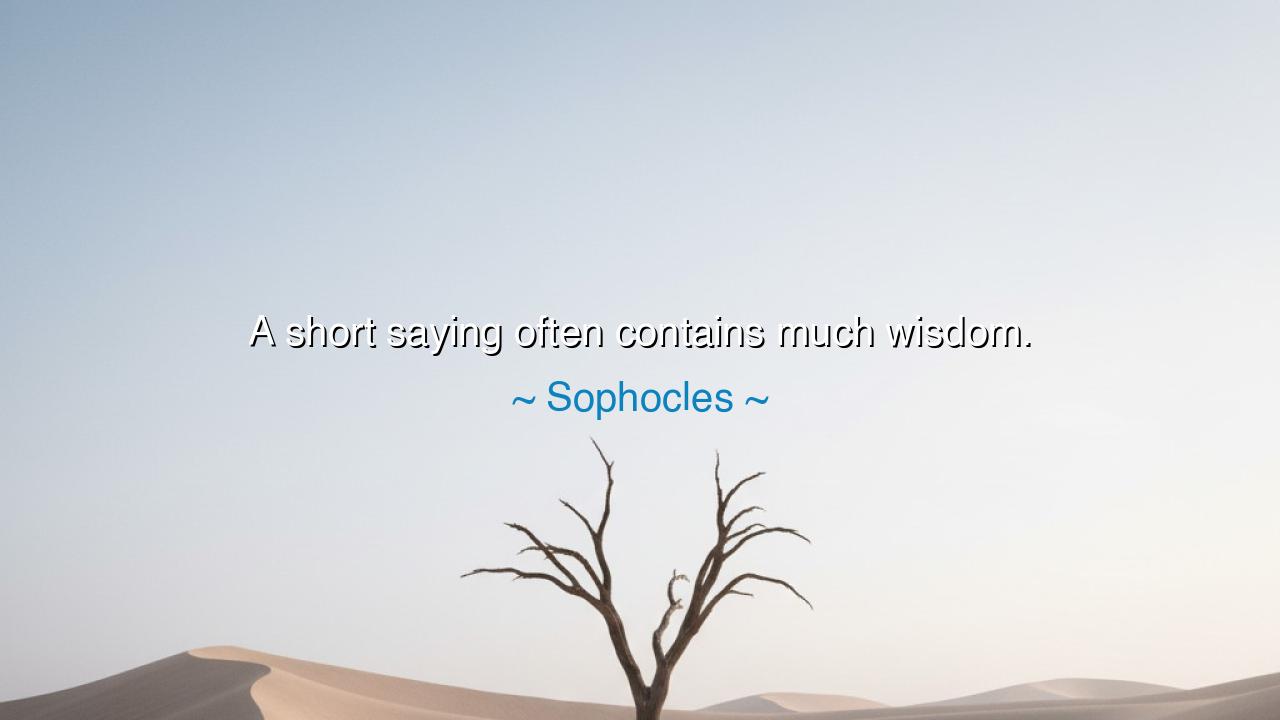
A short saying often contains much wisdom.






Sophocles, voice of tragedy and seer of the human soul, declares: “A short saying often contains much wisdom.” In these few words he teaches that truth does not always need long speeches or grand treatises. Sometimes the greatest wisdom is distilled into a single phrase, sharp as a sword and enduring as stone. Brevity is not weakness; it is the sign of a mind that has cut away excess, leaving only the essence of insight.
The ancients revered such sayings. The Greeks inscribed upon the temple of Apollo at Delphi three commands: “Know thyself,” “Nothing in excess,” and “Surety brings ruin.” Each was but a handful of words, yet within them lay the foundations of philosophy, ethics, and moderation. Sophocles himself, master of words, knew that a single short phrase could outlive entire volumes, shaping generations with its simplicity.
History bears witness to the power of the concise. When the Persian king demanded Sparta’s surrender, the Spartans replied with one word: “If.” In that brief reply was the heart of their courage, a refusal to bow even before overwhelming power. So too, Lincoln’s “Four score and seven years ago” framed the destiny of a nation in the plainest language. Greatness often speaks most clearly in few words.
Sophocles’ teaching also reminds us of the danger of overcomplication. Lengthy discourse may cloud truth, but the short saying pierces the heart. Proverbs, maxims, and epigrams endure across cultures because they carry wisdom in a form the memory can hold and the soul can grasp. They are seeds: small in size, yet vast in what they grow when planted in the mind.
Let future generations remember: a man need not speak endlessly to speak greatly. Wisdom clothed in brevity is wisdom made eternal. Like fire struck from a single spark, a short saying can illuminate the darkness of centuries. Seek not only long arguments, but also the concise truths that endure, for as Sophocles teaches, in a little, much can be contained.






QN39 . Quynh Nhu
This statement raises questions about the relationship between language and understanding. How can a few words encapsulate complex truths or life lessons, and why do some sayings endure while others are forgotten? I’m also curious about the cognitive aspect: do humans naturally respond better to concise expressions of truth, or is the appreciation of brevity culturally conditioned? Finally, how can one craft or recognize short sayings that genuinely convey wisdom rather than mere cleverness?
QNHo Ngoc Quynh Nhu
Reading this, I’m struck by how aphorisms and proverbs have shaped human thought across centuries. Are short sayings more effective because they invite contemplation, leaving space for personal interpretation? I also wonder about the role of storytelling: can a brief statement capture the same depth as a longer narrative, or does it require careful compression of meaning? This prompts reflection on the balance between clarity, insight, and brevity in teaching and sharing wisdom.
VTLe Van Thang
I find this perspective intriguing because it emphasizes precision over verbosity. Does the wisdom in a short saying come from careful phrasing, universal truth, or the ability to provoke reflection? I also wonder whether the most memorable advice is inherently concise, and if simplicity enhances understanding and retention. How can modern communication—especially on social media—take advantage of this principle without oversimplifying complex ideas?
LNNgoc Linh_11A3_To2 Nguyen
This quote makes me think about the power of brevity in communication. Why do some short sayings carry so much wisdom while longer texts can sometimes feel less impactful? I’m curious whether the effectiveness of a brief statement depends on the reader’s prior knowledge or ability to interpret meaning. Additionally, how do cultural context and historical background shape the resonance of short, wise sayings across different audiences?